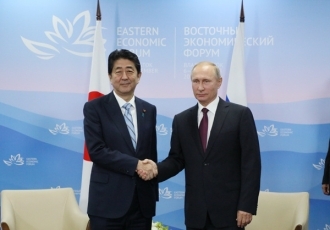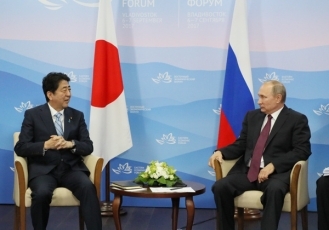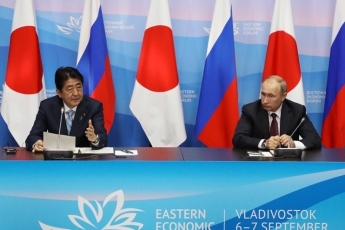Japan-Russia Relations
Japan-Russia Summit Meeting
 (Photo: Cabinet Public Relations Office)
(Photo: Cabinet Public Relations Office)
 (Photo: Cabinet Public Relations Office)
(Photo: Cabinet Public Relations Office)
 (Photo: Cabinet Public Relations Office)
(Photo: Cabinet Public Relations Office)
On September 7, Mr. Shinzo Abe, Prime Minister of Japan attended the Eastern Economic Forum in Vladivostok, the Russian Federation. He held his 19th Japan-Russia Summit Meeting with H.E. Mr. Vladimir Vladimirovich Putin, President of the Russian Federation, for over three hours (a small group meeting for approximately 90 minutes, a one-on-one meeting for approximately 20 minutes, and a large meeting and dinner for approximately 75 minutes).
- 1. Issue of concluding a peace treaty
- 2. North Korea problem
- 3. Bilateral cooperation in a broad range of areas
1. Issue of concluding a peace treaty
With regard to joint economic activities on the Four Northern Islands, the two leaders designated the following five candidate projects to be undertaken promptly. It is specific progress based on the agreement at the summit meeting in December last year. They shared the view that they will explore legal frameworks that will not harm the positions of either side, and will start from those which can be implemented. Additionally, they shared the view that they will continue to discuss possibilities of other projects.
(1) Project of propagation and aquaculture of marine products
(2) Greenhouse vegetable cultivation project
(3) Development of tours based on the islands’ features
(4) Introduction of wind-power generation
(5) Garbage volume reduction measures
The two leaders shared the view that additional field survey will be carried out in early October in order to examine these five candidate projects. They also shared the view that they will examine each project in detail and a framework for movement of people, which is commonly necessary to all the projects in an accelerated manner. Director-General-level working group will be established in order to undertake these considerations.
Additionally, from the viewpoint of ensuring safety of marine traffic, the two leaders decided to examine a project for refurbishment of Kaigara Island Lighthouse, in a manner that does not harm the legal positions of either side.
The two leaders highly appreciated that humanitarian measure for former island residents, such as grave visits to the Seseki area on Kunashiri Island in August, access to which had been restricted, were realized. They also appreciated the establishment of temporary additional entry/exit points at the occasion of grave visits to the Habomai Islands at the end of August, because it greatly reduced physical burden on former island residents.
The two leaders confirmed that special grave visits by airplane will take place in later of this September.
Prime Minister Abe encouraged President Putin to continue discussion on realizing freer entry to the islands by former island residents.
2. North Korea problem
Prime Minister Abe emphasized that North Korea’s decisions to fire a ballistic missile through the sky above Japan and to conduct a nuclear test are an unprecedented, grave and imminent threat not only to Japan but to the region as a whole. He also emphasized it important that the entire international community exert the utmost pressure on North Korea.
The two leaders shared recognition that the nuclear test by North Korea on September 3rd constitutes a serious threat to the peace and stability of the Korean peninsula and the region. They also shared the view that Japan and Russia will continue to collaborate closely.
3. Bilateral cooperation in a broad range of areas
Political dialogue: The two leaders shared the view that they will meet again on the occasion of Asia-Pacific Economic Cooperation (APEC) meeting in November in Viet Nam. With regard to visit to Moscow by Foreign Minister Kono, who was invited by Russia, the two sides agreed to continue to coordinate a specific schedule for Japan-Russia Foreign Ministers’ Meeting and Meeting of the Japan-Russia Intergovernmental Committee on Trade and Economic Issues in November or December.
Defense exchange and security: Prime Minister Abe stated that Japanese and Russian security authorities held candid discussion in September. The two leaders also confirmed that Colonel General Oleg Salyukov, Commander-in-Chief of the Russian Land Forces , will visit Japan in November, and General Valery Gerasimov, Chief of the General Staff of the Armed Forces of the Russian Federation , will visit Japan in December to continue discussion on defense and security.
Economy: The two leaders welcomed the outcomes such as the signing of the amended Tax Convention, the establishment of a 1-billion U.S. dollar joint investment framework by the Japan Bank for International Cooperation (JBIC) and Russian Direct Investment Fund (RDIF) , as well as cooperation toward realizing a digital economy as matters that concern the entire eight-point cooperation plan. Prime Minister Abe confirmed cooperation in the areas of medical care and the urban environment, and the two leaders agreed to further pursue the realization of the eight-point cooperation plan to develop the mutually beneficial Japan-Russia economic relationship.
(Reference)
56 documents were signed by public and private sectors. The number of private-sector documents signed since December last year has reached 100 in total.
Cultural and people-to-people exchanges: The two leaders confirmed that preparations for the “Japan Year in Russia” and “Russia Year in Japan” next year will move ahead in a broad range of fields. They shared the view that Japan will participate in the Saint Petersburg International Economic Forum (SPIEF) on May 25 as a guest country, and that an opening event for the cross exchange years will be jointly hosted by the two countries on the following day, May 26, at the Bolshoi Theatre in Moscow. The two leaders decided to make coordination in order to attend both events.

